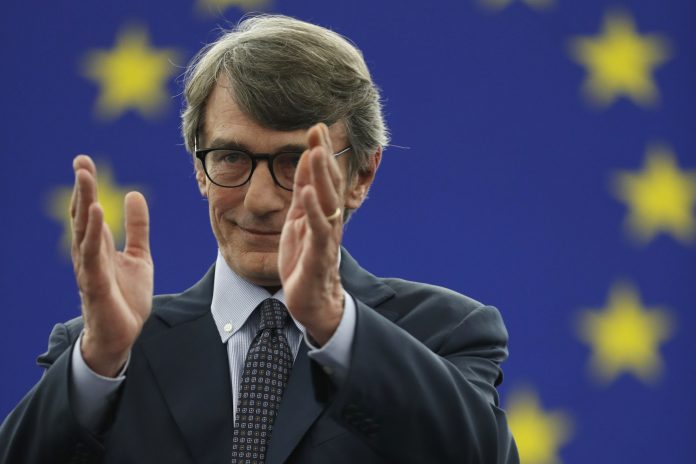
In the end, the European Union’s top jobs jamboree had a familiar old-time ring to it.
Instead of embracing a transparent future, leaders of the 28 EU nations repeated the past as they retreated behind closed doors to divvy up a half-dozen jobs for politicians who will be the public faces of the world’s biggest trade bloc.
The process was completed on Wednesday, when little-known Italian socialist David Sassoli was picked as president of the European Parliament. Two of the three biggest groups in the EU legislature did not field candidates as part of the political compromise sealed by leaders at their secretive three-day summit.
Sassoli’s election left a picture of presidents and prime ministers making backdoor deals, of German Chancellor Angela Merkel and French President Emmanuel Macron throwing their weight around but also of smaller nations ganging up to exert influence. It left European legislators with little more than a cameo appearance.
“We cannot accept that the presidency of this house is being treated as a negotiating chip in old-school backroom Council negotiations,” Greens leader Ska Keller said before she lost her bid for the Parliaments presidency to Sassoli, a legislator few had heard off outside of Italy before Wednesday.
Macron himself acknowledged the deficiencies as the whole selection process ground to a halt Monday after 28 leaders negotiated through the night in small huddles to push their interests.
“When we have too many hidden agendas, we can’t do it,” Macron said.
It was not supposed to be like that this. Not after the European Parliament elections in May showed a marked increase in voter turnout and a new interest in EU politics. Parties promised closer relations with citizens and a listening ear for their complaints and aspirations.
A key element of the campaign had been that the lead candidates of the political groups also would be core candidates to head the EU’s executive Commission, perhaps the most important job needing a new occupant by late fall.
Yet none of the lead candidates had gotten the big job they craved as of Wednesday, snubbed by animosities between leaders and geopolitics.
German Manfred Weber, the lead candidate of the European People’s Party, stood empty handed Wednesday even though his Christian Democrat party is the biggest in the EU Parliament. Weber clutched nothing more than a promise that he might become Parliament president in 2½ years.
Dutch politician Frans Timmermans, the lead candidate of the Socialists & Democrats, is set to remain a first vice president in the European Commission instead of advancing to the helm.
The candidates for the four top posts are from Germany, France, Belgium and Italy, four of the EU’s six original member states. The fifth is held by Spain.
The outcome nevertheless was a victory for the Visigrad 4 countries of Poland, Hungary, Czech Republic and Slovakia, some of whom Timmermans had accused of veering off the democratic path.
For months, the V4 targeted Weber and Timmermans as being too critical of their national governments. The countries developed enough critical mass among the EU leaders to make clear that picking either man would not be worth the hassles it would cause.
“An important victory has been achieved, but new debates keep coming up in international politics,” Hungarian Prime Minister Viktor Orban said.
“At least now, we have the strength to stand up for ourselves,” Orban added.
Missing out on having an eastern European politician get one of the top posts seemed a small price to pay. Instead, the Visigrad 4 rallied behind the European Commission candidacy of German Defense Minister Ursula von der Leyen, a late hour stand in for Timmermans.
Now it is up to the European Parliament to confirm von der Leyen in mid-July.
On Wednesday, she was already at parliament to hobnob and muster support for her bid, shown around by no one less than the spurned Weber.
New president Sassoli insisted he would not automatically play by the rules that the Council of summit leaders had set out.
“I want to make it clear that I am not the Council’s man, I am the parliament’s man,” Sassoli said.q



















